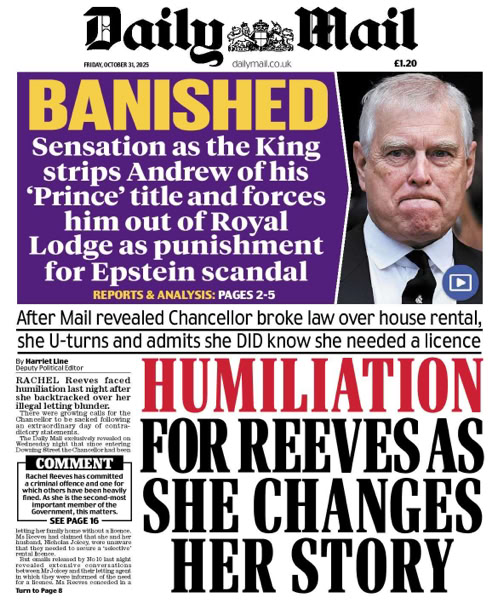
Sad old Daily Mail is struggling to find its way in a changing world that it
no longer instinctively understands

I worry about the Daily Mail. This might seem strange coming from an Expressman who spent most of his working life in an existential rivalry with the Mail.
But that war is over. They won, we lost. The Express is no more, whatever the wretches at Reach might tell you.
However, that doesn’t mean I want our nemesis to go the same way. Rothermere’s Mail and Murdoch’s Times are the last men standing, the final link to a golden age of newspapers. (Never mind about the Guardian, that’s just a flyblown camel living off its fat with a begging letter pinned to its hump.)
So I read last Friday’s Daily Mail with a hint of sadness for a paper no longer in its pomp which is struggling to find its way in a changing world that it no longer instinctively understands. (Which might ring a faint bell for old Expressmen.)
First, it had the feel of an edition derailed by a ferret down the trousers. There they were, carefully crafting a hatchet job on Chancellor Rachel Reeves, when the King announced that his brother would no longer be Prince Andrew, but plain Mr Andrew Mountbatten Windsor.
It was a historic story, the coup de grâce for a shamed, venal princeling delivered by his own brother. A final dramatic downfall that could not be ignored.
It broke inconveniently late in the evening. The Mail, at least in my three-star London edition, gave it a half-page puff below the titlepiece: BANISHED… Reports and analysis Pages 2-5. Below it, the fig-leaf splash continued to be Reeves and the blunder of letting out her family home without the right paperwork from the council.
It turned to Page 8 and continued on Pages 9,10,11, 12 and 13. It was verging on hysterical and was the Mail at its worst: sour, vindictive and reeking of scalp-hunting. Editor Ted Verity seems to have sensed the opportunity to topple Reeves in the same way that Deputy Prime Minister Angela Rayner fell.
But they were quite different cases. Rayner deliberately tangled her property affairs to max out the amount she could claim on tax. It all smacked of disingenuousness and greed.
Reeves’s tale always felt like a cock-up. True, she did break the law, albeit a piffling one. But it was surely a sin of omission, not commission. It sounded as though she had let her husband handle the letting of the house and he – with the bungling connivance of the letting agent – had messed up by not applying for a licence to rent out the house.
Prime Minister Keir Starmer was never going to cut her adrift, especially after the letting agent admitted he had overlooked the need for a licence. The Mail had every right, indeed a duty, to cast a baleful eye on things. But the whole affair made the paper look petty and foolish and cast the editor’s judgment into doubt.
There are two, arguably three, reasons why the Mail came to dominate the Express from the Eighties onwards: David English, Paul Dacre and, if you like, Vere Harmsworth, 3rd Viscount Rothermere, who chose them as editors and let them get on with it.
English, a great newsman who was not above joining the fray with his reporters, set the template for a middle market tabloid, even to the point of insisting it was not a tabloid but a “compact”, a word which, for a target readership of ladies who lunch, has none of the downmarket connotations that could link it to the Mirror or the Sun and so sully them by association.
When Rothermere merged the Daily Sketch with the Mail in 1971 and made English the editor, the Mail sold half as many copies as the Daily Express. By the mid-80s its ABC figure overtook us. I don’t remember the date but I do remember the day.
Alan Frame, my fellow Drone columnist who in those days was, I think, executive editor at the Express, came onto the editorial floor to warn us discreetly that the mood in the editor’s office was not exactly buoyant.
It must have got worse as the years passed, for the Mail continued to add readers at much the same rate as the Express shed them. At the same time, the Mail was snaffling our best reporters, specialists and feature writers: big names such as Geoffrey Levy, Ross Benson and, eventually, even John Junor.
The Mail courted the middle class, and women in particular. It carried sensational showbiz tales, terrifying warnings of the awful diseases that might one day afflict us and it blurred the line between news and comment. Along with the Sun, it was the big beast of Fleet Street.
Then in 1992 Rupert Murdoch tried to poach Paul Dacre, editor of the Evening Standard, to edit The Times and Rothermere acted, fast and decisively. English, architect of the modern Mail and considered unsackable, was eased upstairs and Dacre took his place.
He was a force of nature and brought focus and intensity. His lieutenants admired and respected him, even though he was a hard and sometimes cruel taskmaster. One of them, Paul Carter, a former Daily Express night editor who defected to Kensington and became one of Dacre’s deputy editors, told me that everything – everything – went through Dacre to have his stamp put on it, to be invested with his own view of the world.
Like Beaverbrook’s Express under Arthur Christiansen, Rothermere’s Mail under Dacre looked as though it had all been written and subbed by the same person.
Dacre raged about the office, shouting and swearing. He once told an interviewer: “Shouting brings energy; and energy brings good headlines.” He favoured the c-word so much that the morning news conference became known as the vagina monologues.
Another Express defector, designer Ray Cave, who came up with many of the bold, elegant layouts that distinguished the Mail, sat close to Dacre’s lair.
He told me once: “Dacre would come charging out of his office, point at someone and say, ‘You’re a c***.’ Then he’d point at someone else and say, ‘And you’re a c***.’
“Sometimes I’d try to get him to do a triple-c***. I’d say, ‘Am I a c*** too, Paul? But he never rose to the bait.”
But Dacre could be amusing and self-deprecatory too. Former Express editor Chris Williams, who worked for Dacre for years, tells how, one morning at conference, Dacre was reclining louchely in his executive chair when it gave way under him, pitching him to the floor.
A hush ensued until first Dacre’s hands, then his head, appeared above the tabletop. “Don’t even think it,” he told the assembled hacks.
Dacre, like English a former Expressman and also considered unsackable, was booted upstairs in 2018. Jonathan Harmsworth, 4th Viscount Rothermere, is reported to have explained this by saying: “He was bad for business.”
Others suggest that Rothermere’s wife Claudia persuaded him that the paper had become too strident under Dacre and he should go.
Dacre was undoubtedly a brilliant journalist and perhaps the finest editor of his generation. He took the Mail to a circulation of 2.5 million in 2003 and among the high points of his reign were his branding of the Stephen Lawrence suspects in a Page One banner that said: “MURDERERS”. The subdeck added: “If we are wrong, let them sue us”.
He also lost patience with what he regarded as an over-liberal judiciary and in another Page One onslaught labelled them “ENEMIES OF THE PEOPLE”.
The tabloid Mail had two editors for the first 47 years of its existence. It has now had two more in the last seven years.
Geordie Greig, a well-connected toff who is centrist and a remainer, took over from Dacre. The staff liked him but there was no love lost between him and his predecessor, and he lasted just three years.
Now Verity, a long-time Dacre loyalist, is at the helm and struggling to steer a confident course through the rough seas bedevilling all newspapers. I hope they keep the paper on an even keel. The Mail deserves to survive.
*****
Every now and then, a Times obit will contain not just a life story, but also a valuable nugget of wit, or wisdom, or mirth. It’s why I read them.
Monday’s paper recalled the life of Willie Young, a tough defender for Arsenal and Spurs, among others. His first professional team was Aberdeen, managed by Eddie Turnbull, who drove his players hard in training.
When Young pointed this out, Turnbull told him: “Just you wait. By the time I’m finished you’ll have muscles in your shite.”
*****
How long, do you think, before we hear that the alleged knifeman on the train, Anthony Williams, 32, was suffering a paranoid-schizophrenic episode brought on by his regular smoking of skunk cannabis?
Now that he has been remanded in custody charged with 11 counts of attempted murder, while police examine whether he is linked to further incidents, his brief is going to have to get creative.
*****
There she stood, tired and careworn, in her trademark trouser suit, the same colour as the wine we soon won’t be able to afford, getting her excuses in first.
Rachel Reeves’s 8am Press conference at 10 Downing Street yesterday was to justify why she needs to raise taxes yet again, having promised seven times that she would not be back for more after last year’s shellacking.
It was like listening to the doctor shortly before he sets your broken wrist: “Now, I’m afraid this is going to hurt a little.”
She blethered on about “necessary choices”, “Budget for growth” and the need to protect families from high inflation and save public services from austerity. The extra tax burden she has in store for us will achieve none of those things.
The businesses that create wealth are at the end of their tether. Imposing more tax will stifle growth and scare them off investing.
Many, including food retailers, will pass the taxes on to the rest of us, thus fuelling price inflation. The treasured NHS will get its annual injection of cash and so get even more expensive without any noticeable rise in its quality of service.
Why do Labour politicians have to learn harsh economic lessons over and over again. Is no one taking notes?
Last year, Reeves stood outside No. 11 Downing Street, so pleased with herself as she displayed the famous red box. She looked like the Head Girl about to go up on stage to receive the Principal’s prize, lips pursed prissily, giving a little toss of her chestnut bob as she left to present her Budget to the Commons.
This year, I suspect, will be different. If this sorry lot last five years, I’ll be amazed.
RICHARD DISMORE
5 November 2025
